Home » Hunting Culture » Practicing Good Upland Hunting Etiquette
Practicing Good Upland Hunting Etiquette
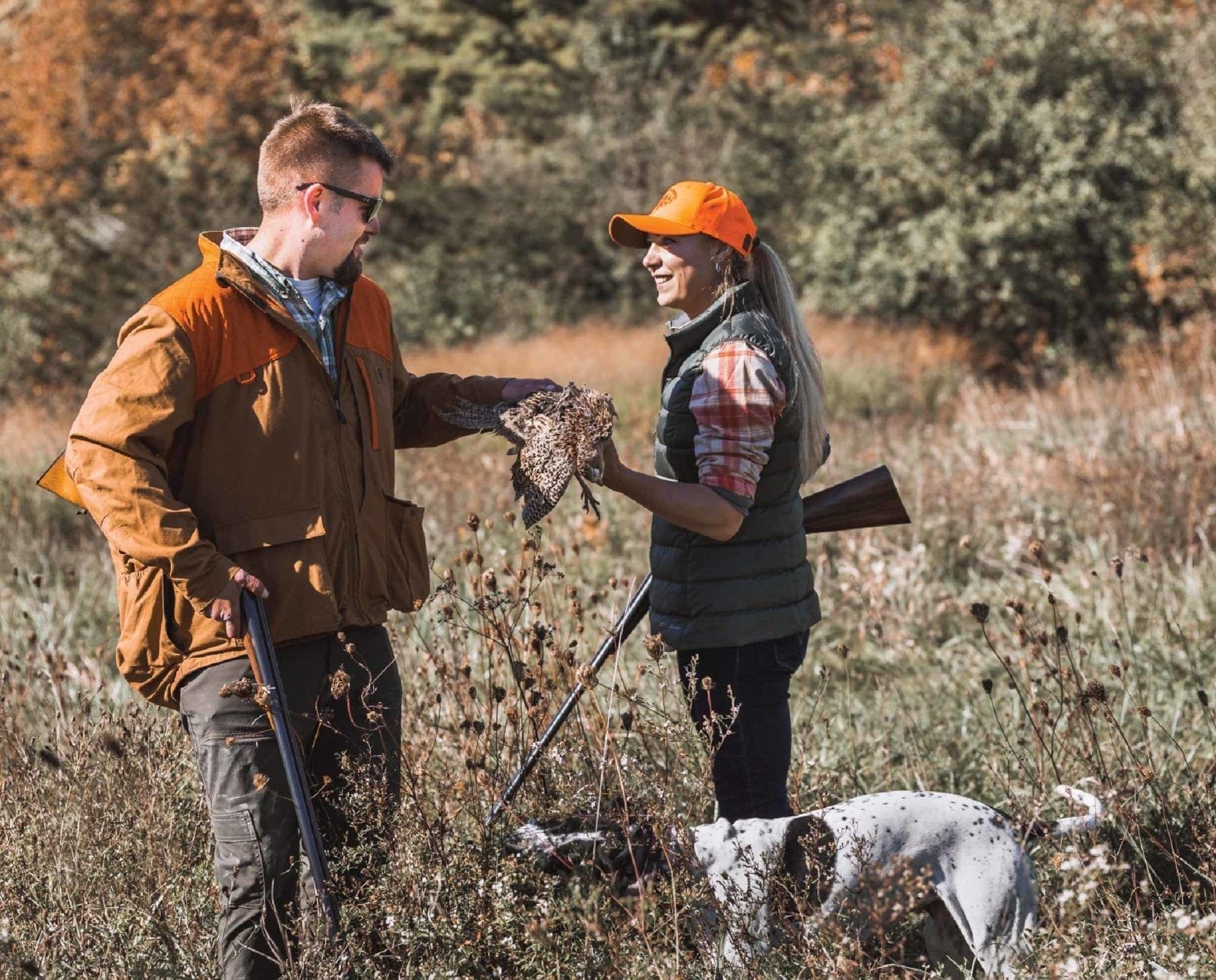
Chris Ingram is a freelance outdoor writer and photojournalist where…
Good hunting etiquette extends beyond the law to ensure that hunters maintain a good reputation in local and outdoor communities
Everyone is familiar with the old adages that first impressions count and to always put your best foot forward. Amid a changing and sometimes volatile political and social climate surrounding hunting and firearms, the least we can do as upland hunters is to ensure that our conduct in the field is above reproach. We are losing more and more covers each year to posted signs, observing a rise in hunting pressure, and finding more landowners and community members with complaints of negative experiences with hunters.
While there are no formal rules to regulate our behavior in and out of the field, it’s worth considering how our actions and mindset may be perceived while we’re out enjoying the uplands. Positive interactions and responsible conduct will improve our persona and position as hunters both individually and as a community.
Upland etiquette starts before the hunt
Do your homework and scout your covers in the off-season; there’s no better time to take advantage of the digital scouting resource of OnX Maps to identify potential locations and then take a walk to proof your findings.
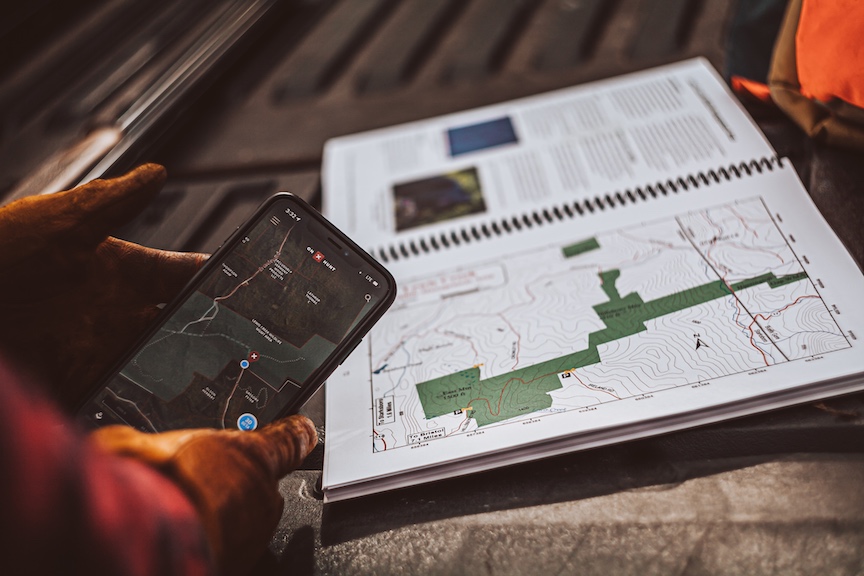
Familiarize yourself with concurrent hunting seasons and plan your outings around them; this is especially beneficial when hunting public land. Bowhunters will often sit on their stands around dusk and dawn and there may be duck hunters in the marshes or small game hunters moving through the property. Rabbit hunting with beagles is another favorite pastime and, in some places, hunting with hounds for bear, bobcat and other furbearers is still pursued. It’s good to be aware of what other hunting activities might be taking place while you’re out in the field.
When seeking private land permission, present yourself well and put yourself in a position to impress. Dress decently, be polite, and consider avoiding early mornings, dinner time and late evenings when knocking on doors. During the COVID-19 pandemic, consider reaching out to landowners electronically through telephone, email, or Facebook messenger. Have a plan, ask the proper questions, and be prepared to answer their questions appropriately. Be direct and express your intent to hunt the property, including where and when you’re requesting to use the area. Landowners may prioritize hunting rights on their property to family, friends, or farmhands and there may be a full house during rifle deer season. No matter what the arrangement may be, remain grateful and accommodating. Consider leaving a note with your personal contact info and vehicle description.
When you arrive to hunt private land, avoid driving across fields and damaging crops. Park far enough off any roadway and do not block gates. If you were unable to make contact with a landowner and can legally hunt un-posted land, leave a note on your dash that shares the nature of your visit, your approximate whereabouts, and a cell number should someone need to contact you. Be sure to leave a trip itinerary with your spouse, family, or friends back home with where you plan to be, the duration of your outing, and when you plan to return home. If you encounter other hunters at the start of a hunt, make a plan to work around each other on larger properties or consider joining forces on the small covers and short walks.
Practicing good etiquette during the hunt
Know the area you are hunting and double-check your OnX app regularly to stay within the boundaries of the property that you have permission to hunt. Stay far enough away from roads; some states have legal distances you must follow. Avoid hunting too close to residences, dwellings, and other farm structures as well any livestock on-site. Navigate carefully over fences and close any gates that you pass though. If you see something amiss, whether it be property, livestock, or unlawful activity by others, notify the landowner.
Even on private property where you do not expect to encounter others, it is always a good idea to wear enough blaze orange to be seen by others, including members of your own hunting party. Public land hunters may additionally consider outfitting their dogs in an orange vest for added visibility in high-traffic areas and whenever big game seasons are open.
Many people are enjoying fall recreation and you may encounter hikers, foragers, wildlife photographers, and most likely other hunters. Make your presence known if you encounter another hunting party or another individual. Put your dogs on lead to ease the anxiety of others and to maintain control of any multi-party dog situations.
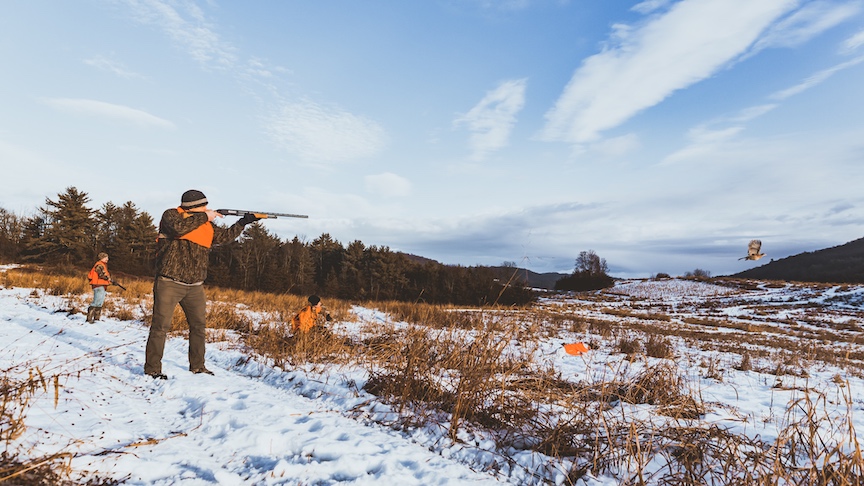
Be mindful of your shooting and be aware of where all other hunters and dogs are at all times. Never shoot over hunters or dogs or toward houses, buildings, or roads. Don’t ever be afraid to refrain from pulling the trigger if the opportunity is questionable; safety should always be the top priority in the field.
Follow up to recover every downed and wounded bird. For the dog-less hunter, bring along an orange handkerchief or extra blaze cap: one to hang where you stood when you took the shot and the other to place at the last location you marked the fallen target. This simple technique has increased the recovery of many birds for solo, dog-less hunters.
And lastly, never handle another handler’s dog.
Good upland etiquette extends after the hunt
By now you’ve reaped the rewards of the work and the process leading up to the end of the hunt. Be sure to collect your spent hulls and pack out what you’ve packed in. Leave the property just as you found it, or better if possible. Thank any landowner for their generosity of your access and consider bringing them some wild game, baked goods, or perhaps a gift card to express your gratitude. Offer to pitch in and help with chores and farm work in the off-season.
If someone has invited you to a cover, don’t go back with your buddies without discussing it with your host. If you’re new to the game or new to an area, a great way to make friends is to share the work and build a network of like-minded hunters. You’ll get more invitations to hunt by inviting others to hunt with you. Don’t be a mooch! Do some scouting, secure some covers, and offer to chip in on gas or shells.
Introduce a new hunter to the uplands. Set them up for success by answering their questions and tailoring the hunt to their interests and enjoyment. There is no greater feeling than witnessing a new hunter immersed in curiosity and then harvest their first bird. Mentorship plays a vital rule in the future of upland birds and upland hunting.
This isn’t meant to be an exhaustive set of parameters to which you must adhere, but rather a few simple suggestions for you to ponder during your upland pursuits. Following some of these basic principles often makes the difference when securing and maintaining private land access and the good graces of local landowners and public perception. With our hunting culture under constant scrutiny, there is an inherent duty we have as safe and ethical hunters to impress upon our communities and fellow hunters that acting ethically ensures our place as trustworthy stewards in the outdoor sporting community and conservation movement.
Chris Ingram is a freelance outdoor writer and photojournalist where he lives in Vermont with his wife. As an ardent bird hunter and public lands advocate, his motivations are rooted in sharing information, creating opportunity, promoting kinship, and developing inspiring content in the sporting and conservation communities. Chris works in Outreach & Communications for the Vermont Fish & Wildlife Department where he hopes to utilize his passion and enthusiasm to strengthen and unite the sporting community and conservation movement. To learn more about Chris and his work, check out Featherwind Creative on social media and visit www.featherwindcreative.com

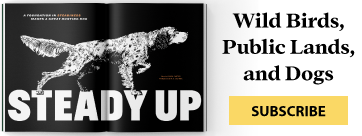
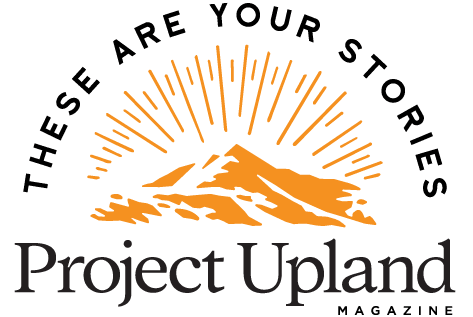


All good food for thought and valuable reminders, no matter how long we’ve been at it. Thank you.
Nicely written, you bring up a number of important points.
I’m pretty sure all of use had some training or instruction in hunter ethics and etiquette when we took our initial hunter education class for that first license. Unfortunately, enough people forget etiquette to give the vast majority of hunters a bad name. It’s great to bring up the topic to remind us how important ethics and etiquette are to the future of hunting.
Only point I might change is not just avoiding driving across fields, don’t unless you have specific permission from the land owner. It is way too easy to damage fields or even access roads along them with a vehicle. One other pet peeve, if you open a gate to go through it, close it behind you when you are coming and going.
I concur with Earl’s remarks. Also, thank you for mentioning putting your dog on lead when encountering others. I do this with my young dog routinely and many others I encounter do the same.
I encountered a hunter and his GSP in the parking lot of the WMA I hunted this past weekend. His good-looking GSP came over to greet me, ignoring his owner’s efforts to recall him. Within a few moments, our two dogs were fighting. I separated them without issue and put my dog in his kennel. Without him being on lead, it would have been a more complicated matter with more risk of injury. The GSP’s owner came over and apologized, saying “He never did that before.” Predicting outcomes when two dogs meet is difficult – use a lead.
I as well concur with Chris, Earl, and Ted on this article. People forget about courtesy as well as the point that in some areas they may be on belongs to someone they least expect. I was actually threatened and harassed by a person on Quail opener this year because he felt that he was more entitled to be on my uncle’s land than we were (though we owned the property). We had spent a lot of time posting coyote trap signs around our fields (we have sheep in a near field and the traps save the sheep from ‘yotes but horrible on gun dogs when people don’t know the area) when he pulled up, said that he had scouted this place a few days before and we needed to get our aXXXX out of there. My uncle was taken aback but told the guy, there’s plenty of space for everyone and for him to be safe with his GSP. The guy decided to argue instead which led to my uncle going back to the truck, calling the game warden (who he is friends with as many ranchers and farmers are in my area) and sat at the truck until the warden arrived about 90 minutes later. The guy was then checked by the warden who pulled dove and two pheasant hen from his bag and more quail than the daily limit (dove and pheasant were not open at this time). He was also using lead in a non-toxic zone. All good and done with this story this all resulted in Mr. Ingram’s first paragraph, more land owners are closing their land off to hunters. In this case my uncle put out the no hunting signs without written permission. This takes away 12,000 acres known to produce great dove, quail, and the rare pheasant in our Southern California farm town.
Very good and well written article! I’ve hunted Private and Public land for over 50 years and would add one more thing concerning gates. Leave them as you found them! If a gate is open, it may well be for livestock movement to access feed, shelter and water. Don’t assume another hunter left the gate open by mistake. And mention it to the Landowner as you’re thanking them for the opportunity to use their property.